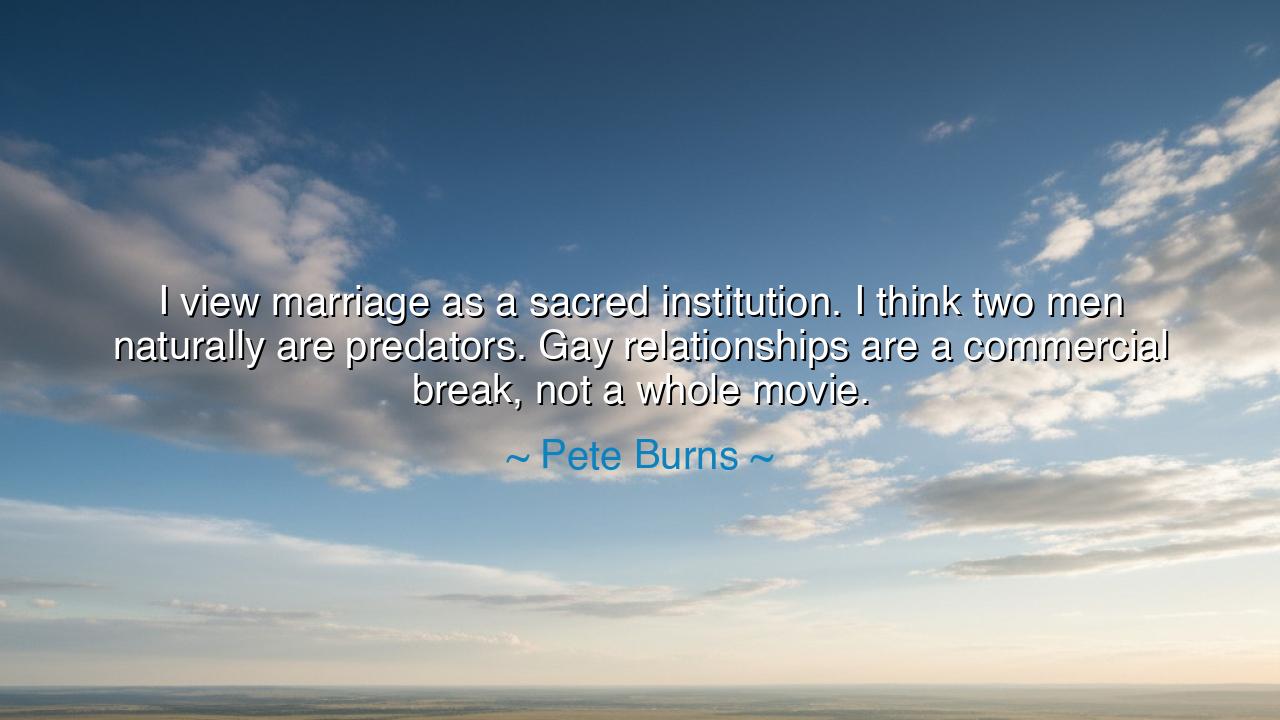
I view marriage as a sacred institution. I think two men
I view marriage as a sacred institution. I think two men naturally are predators. Gay relationships are a commercial break, not a whole movie.






Hear the fiery and paradoxical words of Pete Burns, a man of spectacle, transformation, and provocation, who declared: “I view marriage as a sacred institution. I think two men naturally are predators. Gay relationships are a commercial break, not a whole movie.” In this utterance we find both reverence and cynicism, both admiration for tradition and suspicion of human weakness. For Burns, ever the rebel and performer, spoke not as one who bowed quietly to convention, but as one who tested its edges, revealing the contradictions of love, desire, and human frailty.
He begins by honoring marriage as a sacred institution. Even in an age when many mocked or trivialized it, Burns recognized its gravity. To call something “sacred” is to lift it beyond convenience, to set it apart as holy, demanding reverence. Marriage, in his eyes, was not merely a social contract or a fleeting passion, but a covenant meant to endure, to stand as a whole story rather than a passing scene. This foundation reveals that beneath his flamboyant life, he carried within him a deep seriousness about commitment and the weight of vows.
Yet he follows with the unsettling claim that “two men naturally are predators.” Here lies his cynicism, drawn from his own experiences and observations of desire among men. In this, Burns echoes an ancient suspicion—that unchecked passion, without the tempering of covenant or balance, can consume rather than sustain. He did not speak to condemn, but to expose the dangers of human appetite when unmoored from responsibility. His language is sharp, perhaps exaggerated, yet it reflects the tension he saw between fleeting indulgence and enduring union.
The phrase “a commercial break, not a whole movie” reveals his artistic spirit. For Burns, relationships that lacked depth or covenant were like interruptions in a grand narrative—brief, colorful, but without continuity. A commercial entertains, amuses, even dazzles for a moment, but the story resumes only when it has passed. In this metaphor, he suggests that true love, like a movie, must unfold with patience, with a beginning, middle, and end, with arcs of struggle and triumph, with depth that fleeting pleasures cannot provide.
History itself provides echoes of Burns’s paradox. Consider the excesses of the late Roman Empire, where fleeting indulgences often overshadowed loyalty, and marriages collapsed beneath the weight of passion without discipline. Yet alongside these failures, there were also stories of enduring partnerships, of emperors and empresses who held each other through storms of intrigue and betrayal. In these examples we see what Burns himself implied: that without reverence, love collapses into appetite; but with reverence, it may transcend appetite and become something lasting, even eternal.
His words are not an eternal decree but a mirror, showing us the tension between sacredness and desire, permanence and impermanence. They reveal his struggle as one who lived at the margins, both celebrating freedom and lamenting its dangers. Burns teaches us that passion alone is not enough; what makes love endure is covenant, discipline, and respect. Without these, relationships—whatever their form—become fragments rather than stories.
O children of tomorrow, learn from this strange teaching: do not reduce love to fleeting satisfaction. Guard marriage—or any union you claim—as sacred, not to cage your freedom but to give your freedom meaning. If you desire not a commercial but a story, then seek depth, seek responsibility, seek reverence. Let your relationships be more than flashes of appetite; let them be journeys that endure across years, worthy of being called the whole movie of your life.
Thus the paradox of Pete Burns remains: he honored marriage as sacred while exposing the dangers of relationships lived without covenant. His words remind us that love demands more than desire—it demands reverence, discipline, and the courage to turn a fleeting spark into a flame that endures through the story of a lifetime.






AAdministratorAdministrator
Welcome, honored guests. Please leave a comment, we will respond soon